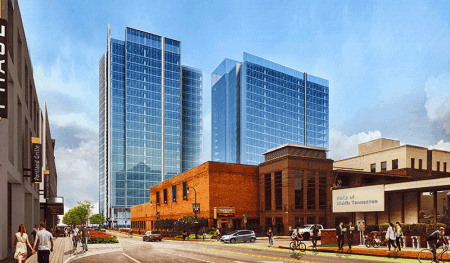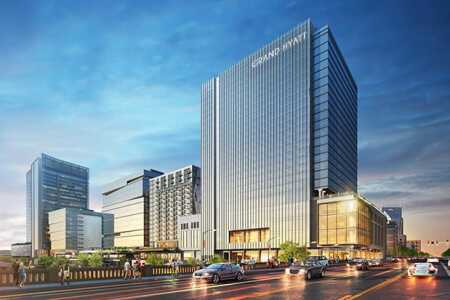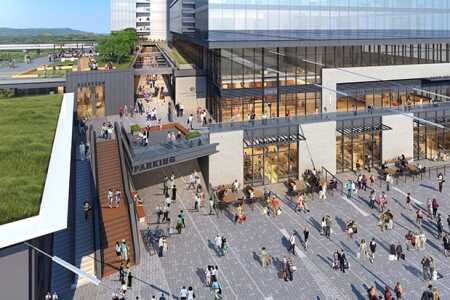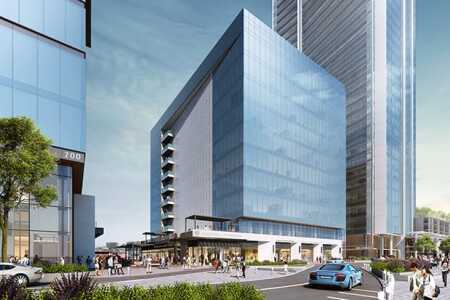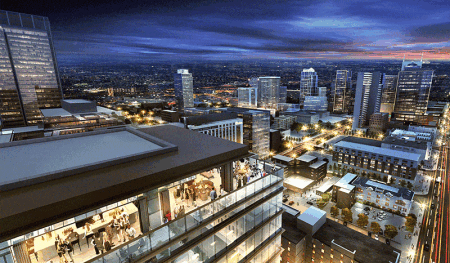The first sight that many visitors get of downtown Nashville is a 100-foot-high (31 m) construction crane poised over a foundation pit.
As they pass the limestone castle of the old Union Station, the land drops away across the street. Bulldozers swarm over a vast field piled with gravel and sections of concrete pipe as workers lay the foundations of a $1 billion redevelopment.
“Nashville Yards reimagines the gateway to downtown,” says Cary Mack, co–managing partner and managing principal of Southwest Value Partners, the lead developer of Nashville Yards, a project that is intended to weave together all the strands of Nashville’s development boom.
A new concert venue at the site will add to Nashville’s music scene. A Grand Hyatt hotel will host visitors to the city’s grand convention center, which opened in 2013. An office tower underway for online retailer Amazon will add to the city’s diverse economy. And a bold new public green space planned for the site will bring all these strands together. For a project where construction began as recently as October 2017, a surprising amount of the work is already under construction.
Former Bible Factory
In November 2015, LifeWay Christian Resources announced it would sell its 14-acre (1.3 ha) home in downtown Nashville. As the publishing arm of the Southern Baptist Convention, LifeWay once printed and shipped millions of Bibles from its campus alongside a cluster of railroad tracks that run along the western edge of downtown.
People walking along the elevated stretches of Broadway and Church Street that cross the site and pass over the railroad tracks looked down on parking lots and nondescript warehouses 30 feet (11 m) below. The giant industrial buildings were largely silent; the printing presses had been moved out years before.
Southwest Value Partners, a real estate firm based in San Diego, paid $125 million for the campus, while LifeWay began building a new 250,000-square-foot (23,000 sq m) tower for itself a few blocks away.
If everything goes according to Southwest Value Partners’ master plan, the project will eventually include more than 3.5 million square feet (325,000 sq m) of class A and creative office space, 1,000 residential units, 400,000 square feet (37,000 sq m) of retail and entertainment space, and 1,100 hotel rooms.
It all adds up to a total of over 6 million square feet (557,000 sq m)—a fraction of the 26 million square feet (2.4 million sq m) that would be allowed on the site under the city’s zoning rules. “We are building right around 20 percent of the entitled value,” says Joe Bucher, principal in the Nashville office of architecture firm Gresham Smith and lead architect for the Nashville Yards project.
Building less than the site allows gives the developers an opportunity to create spaces between the buildings planned for Nashville Yards. “Nashville is so tight and confined,” says Bucher. “Those open spaces will define Nashville Yards.”
Southwest Value Partners also found room in its master plan for a 1.3-acre (0.6 ha) park. “We thought of the park as the bass line: it set the rhythm of the whole development,” says Kim Hawkins, founding principal of Hawkins Partners, a local landscape architecture firm working on the Nashville Yards project.
Southwest Value Partners bought the land for the park from CSX Corp., which sends freight trains rumbling along the tracks at Nashville Yards at a sedate 10 miles (16 km) per hour so as not to disturb downtown.
The park terraces rise from the railroad tracks at the base and then along the western side of the property to connect into the smaller passageways and courtyards within the development, while also interfacing at the elevated level of Broadway and Church Street 26 feet (8 m) above the tracks. Together, the park forms the pedestrian fabric of the development.
The park will be privately owned, operated, and maintained by Nashville Yards, with activities and amenities such as afternoon yoga, Friday concerts, and food trucks, says Hawkins.
“Based on the 2017 Nashville Parks and Greenways Master Plan, Plan2Play, we have a tremendous deficit of parks and open space downtown,” she notes. The park is a valuable asset to the Nashville Yards development and the surrounding community—especially the planned retail, office, residential, and hotel rooms that will border the park.
The park will offer opportunities to create unique views of downtown Nashville. For example, patrons at an outdoor restaurant table will be able to take in the bustle of the Boardwalk at the top of the park, engage in fitness opportunities or an impromptu concert, or look out over the terraced park stretching down toward the slow-rolling trains passing below.
Preparing the Site
The developers of Nashville Yards are also making $79 million in improvements to infrastructure like roads and utilities, reimbursing Southwest Value Partners $15 million—an investment that is expected to quickly pay for itself.
“We think Nashville Yards will generate $429 million in property taxes plus an uncounted amount of sales tax income over the next 30 years,” says Matthew Wiltshire, director of the Mayor’s Office of Economic and Community Development for the city of Nashville.
However, city officials have not had to offer incentives such as big tax breaks or favorable financing based on future tax income to entice developers. “We don’t want to be arrogant about it—we think we have a valuable thing in downtown Nashville,” says Wiltshire.
The infrastructure work at Nashville Yards will also add a new vertical dimension to Nashville’s street grid with new elevated streets like the “Upper” 10th Avenue branch off of Broadway and Church Street to create a new ground floor and allow the existing lower street to service the buildings from underneath.
Taxis will be able to turn off Broadway to pull up in front of the new concert venue. Amazon employees will be able to turn their cars off Church Street to drive directly to the multilevel parking at Amazon’s new building.
Grand Hyatt Rising
In 2016, Hyatt announced its plans to come to Nashville Yards, and a ground-breaking ceremony was held in early 2018.
“Nashville definitely has a need for luxury hotels. Demand has increased exponentially in recent years, and the Grand Hyatt will offer a high-end hospitality experience that isn’t currently available in the city,” says Tim Horton, chief operating officer of Louisiana-based Dimension Development Company. Dimension will co-own the hotel with Southwest Value Partners, and the two companies are partnering on its development.
With 2 million square feet (186,000 sq m) of event space, Nashville’s convention facility, the Music City Center, has boosted the need for more hotel beds nearby—as has the city’s record-breaking tourism boom that brought 15.2 million visitors in 2018.
Now under construction, the Grand Hyatt will open its 591 rooms and suites in fall 2020, with a rooftop bar and pool, restaurants, and a world-class spa listed among its amenities. The hotel also will include 77,000 square feet (7,200 sq m) of its own conference space, including a 20,000-square-foot (1,900 sq m) main ballroom.
The hotel will stand on high ground, easily visible from the honky-tonk bars and restaurants that line Broadway. “The hotel’s location at Nashville Yards allows close proximity to Broadway without being right in the middle of the noise,” says Bucher.
More Music for Music City
Music is at the heart of Nashville Yards; a 4,000-capacity concert venue will stand in the center of the development. That is twice the size of Nashville’s famous Ryman Auditorium, once a landmark home to the Grand Ole Opry.
“We had a music venue in this thing from day one,” says Bucher. “The amazing part of the story is that Southwest Value Partners found a way to pull that off with AEG’s help.”
The music venue at Nashville Yards will be part of an entertainment district planned by AEG, an industry-leading venue developer and concert promoter. Based in Los Angeles, AEG is the organization that has created renowned entertainment districts such as L.A. LIVE, London’s the O2, and Berlin’s Mercedes Platz; developed iconic arenas and theaters such as the STAPLES Center and Times Square’s Sony Playstation Theater, among others; and presents more than 11,000 shows annually through its AEG Presents division.
AEG has signed an agreement to buy four acres (1.6 ha) of the Nashville Yards site to create an entertainment district unique to Music City. In addition to the concert venue, the district will include a small entertainment club, a boutique hotel with about 315 rooms and 25,000 square feet (2,300 sq m) of meeting space, and a variety of food and beverage options.
AEG also plans to build a nine-screen theater complex on Church Street. Movie theaters are a classic gateway to draw people into mixed-use neighborhoods. AEG plans to break ground on its entertainment district in the third quarter of 2019. The company also has an option to buy an adjacent 1.5-acre (0.6 ha) parcel at Nashville Yards to develop into office, residential, hotel, and retail space.
The retail spaces will benefit from the overall strength of downtown Nashville. Less than 4 percent of the class A retail space was vacant at the end of 2018, according to the Nashville Downtown Partnership.
“Because of the strong entertainment market in Nashville, retail has always enjoyed good occupancy,” says Tom Turner, president and CEO of the Nashville Downtown Partnership.
Amazon’s New Operations Center
On February 8, workers broke ground on Amazon’s “Operations Center of Excellence” at Nashville Yards. The first phase of the center includes a tower planned to rise 20 stories over Church Street, with more than 500,000 square feet (47,000 sq m) of office space for 5,000 Amazon employees.
Work began just a few months after Amazon first announced its plans to come to Nashville Yards in November 2018. Amazon reportedly considered several cities for its operations center.
Part of the pitch that the developers of Nashville Yards made to Amazon was how fast the project could move forward. They had already completed the demolition of LifeWay’s warehouses, and the sites had been prepared for new development.
Amazon’s new offices will replace one of downtown’s few remaining giant parking lots, filling a massive gap along one side of the Church Street viaduct as it cuts through the old LifeWay campus.
City officials were eager to get Amazon’s attention. Nashville plans to give the company a cash incentive of $500 per year per employee for seven years. So, in a year in which Amazon has 5,000 employees at the center, the city would write a check for $2.5 million.
The master plan for Nashville Yards has room for more than 3.5 million square feet (325,000 sq m) of office space. Local experts say that the Nashville office market could use the space. “There is still a significant opportunity to build new office space downtown,” says Turner. Until recently, very few people lived downtown. After a flurry of new construction in the past decade, there were 8,256 new apartments in the downtown core at the end of 2018, according to the Downtown Partnership.
At present, just 4 percent of the class A office space downtown is vacant, and that vacancy rate is unlikely to rise anytime soon, he says. There is enough demand from companies to fill an additional 4 million square feet (372,000 sq m) of new, class A office space in downtown Nashville, according to a 2018 market analysis. Also, most new office space in Nashville that is currently planned or under construction already has companies committed to move in, according to the Downtown Partnership.
Nashville Yards also has space in its master plan for several new residential buildings. Demand for apartments is very high in downtown Nashville; 97 percent of the apartments there were occupied at the end of 2018, according to the Downtown Partnership.
Until recently, very few people lived downtown. After a flurry of new construction in the last decade, there were 8,256 new apartments in the downtown core at the end of 2018, according to the Downtown Partnership. Developers have another 2,000 under construction, with 3,200 more units in various stages of preconstruction planning. Despite all that, city officials believe that downtown would benefit from even more new apartments.
“Nashville probably has half of the residential that we should have downtown compared to other comparable cities like Austin, Texas,” says Wiltshire.


